#gay linguistics
Explore tagged Tumblr posts
Text
Hi yes hello something I find beautiful about See Your Love is the way it uses sign language. I mean, even when Zixiang learned incredibly fast we can still see how the signs he uses could be considered more 'basic' than the ones Shaopeng uses. One example is the quote that's translated as "I'll go check"
Zixiang says "我去看看" which is like "I'll go see" which just uses the reduplication of the sign for see (看)

But or lovely Shaopeng says "我去调查" or "I'll go check/ I'll go investigate" which uses a completely different sign

So it just shows how mastery of the language peeks through their 'speech' and I just love that thank you. Just how people speak different they sign different and this gets lost in the subs... Both English AND mandarin. As they are both translated as "我去看看" .


Thank you for coming to my tedtalk
#i didn't make it up#this is factual#check the TLS dictionary#gay linguistics#taiwan bl#bl drama#boys love#shaopeng x zixiang#see your love
42 notes
·
View notes
Text
“Troye Sivan had words for straight people who have gotten ‘way too comfortable” discussing gay celebrities and their sex lives — especially those who are fond of throwing around the term twink.
‘This is a general note: if you say twink when you meant to say f@ggot, that’s still a slur,’ the Rush singer said in a September 15 TikTok video. ‘That’s like our word. I don’t think straight people should be using that.’”
#lgbtq+#gay linguistics#queer linguistics#troye sivan#i really appreciate his call to action that straight people not use queer terms or concepts for content#which is exactly what happened#there is often an infantilizing effect that straights have towards queer concepts#especially regarding sex#that i detest#especially because sexuality and concepts around sex are SO IMPORTANT in queer spaces#and very often straights are not forthcoming that those concepts make them uncomfortable#which like#the straights can fuck off if they can’t handle being around frank conversations#of sexuality and identity
45 notes
·
View notes
Text
Personally, it feels weird and performative to throw an x into an already gender-neutral term just for the hell of it, but want to know what others think.
#folks vs folx#folx#performative activism#performative allyship#queer#queer vocabulary#reblog for science#reblog for greater sample size#queer language#queer linguistics#linguistics#gay linguistics#for reference I am queer and work at a v v queer organization and I HATE when the cishets at work use folx in emails#it’s insane to me#about me#random thoughts
17 notes
·
View notes
Text
gay accent vs lesbian accent
super interesting vid by @etymology_nerd on yt
308 notes
·
View notes
Text
Polari

If you want to learn more about Polari, check out the fun book Fabulosa! The story of Polari, Britain’s secret gay language:

946 notes
·
View notes
Text

Shinobu Orikuchi (Chōkū Shaku) (deceased)
Gender: Male
Sexuality: Gay
DOB: 11 February 1887
RIP: 3 September 1953
Ethnicity: Japanese
Occupation: Ethnologist, linguist, folklorist, novelist, poet, teacher, scholar
#Shinobu Orikuchi#Choku Shaku#lgbt history#lgbt#qpoc#male#gay#1887#rip#historical#japanese#asian#poc#linguist#academic#scholar#poet#writer#teacher
103 notes
·
View notes
Text



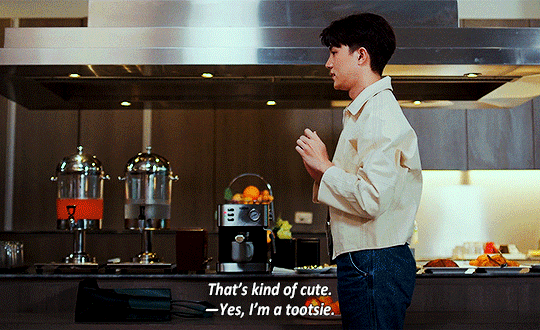


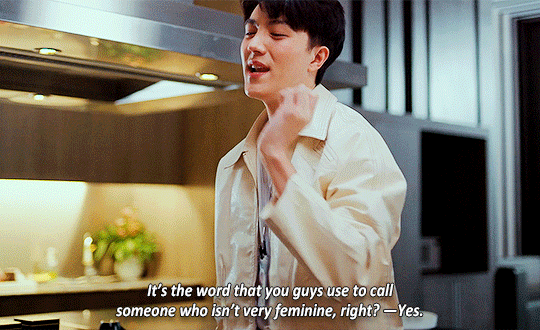
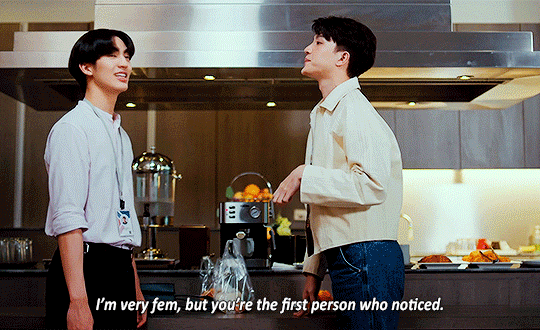
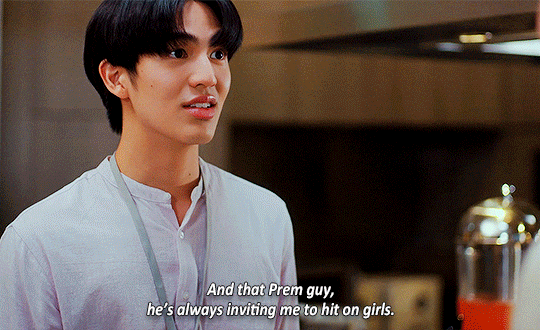
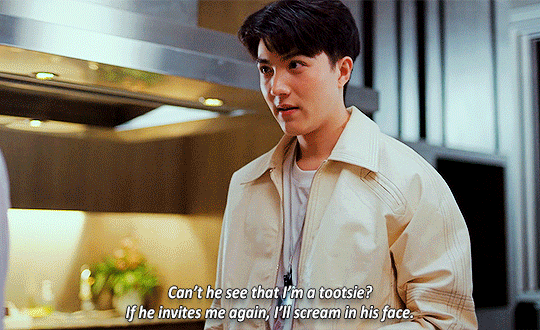
A few notes on Pat and Chot's conversation:
🔹Ke (เกย์) is a neutral expression that is the phonetic adaptation of the English word gay.
🔹Tut (ตุ๊ด) is a vulgar and pejorative expression used to refer to a very effeminate homosexual man and can have multiple translations, as sissy, queen, [or in this case: tootsie] etc.
🔹Je (เจ๊) is a Thai honorific from 姐 for “elder sister”. Chot uses it to refer to himself. Pat later uses it to address Chot.
🔹krap/kha (ครับ / ค่ะ) are gender-oriented particles. Chot uses the traditionally female particle for himself.
🌈Sources: LGTBIQ+ Enciclopaedia, Thaipod101
#step by step#step by step the series#bruce sirikorn#ben bunyapol#stepbystepedit#thai bl#thai drama#bl drama#bl series#my edits.#i added some notes and explanations that imo make this conversation easier to understand#because a lot of the nuances are lost in translation#which isn't the translator's fault - it's just how language works#i love it so much#and i love bruce#and we need more fem gays in bl#who are allowed to be loud and proud and are celebrated for it#Tud/tut might come from the movies Tootsie but I'm not sure#(false friends are a super common thing in linguistics and i haven't checked the word's etymology)#it's a term that chot has very obviously reclaimed for himself
821 notes
·
View notes
Text





Tfw gay doesn’t mean cheery and mirthful anymore
#I got this idea and had to draw it EXPEDITIOUSLY#it’s so so stupid but I love it literally to death#Damien summed up#he is a dumb broken nosed old man that doesn’t know current slang and is ALSO a raging homosexual#bisexual technically and he doesn’t know it yet but semantics#ALSO I BETTER NOT GET ANY GAY LINGUISTS ON MY POST OKAY I KNOW GAY STARTED TO REFER TO HOMOSEXUALITY IN THE 40S I JUST DONT CARE#and this was funnier#fallout 4#fallout#fallout 4 fanart#fallout fanart#paladin danse#Damien tag#gay#blood tw#tw blood#serenade draws#fanart
347 notes
·
View notes
Text
Interesting Linguistic Notes from Jun & Jun episode 4
In her phone conversation with Choi Jun, Young does not exactly call herself his "fiancé."
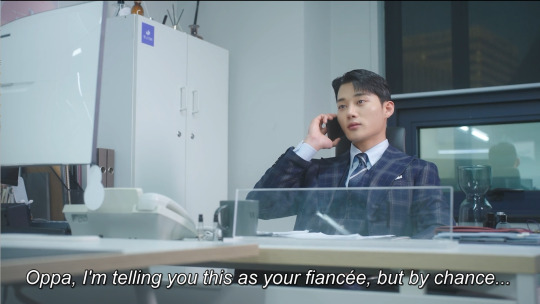
She uses the word 구녀로서, which roughly translates to "as your woman." 구녀 when used alone means "she/old woman," but when paired with 로서 (which means to do something as a person who holds a specific status) it transforms into the idea more along the lines of being that person's singular girl. So you'll sometimes see it translated to "as your old woman" because it's more akin to the slang way we refer to our moms and wives than it is to the way we might say "I'm your woman" to refer to ourselves as your romantic partner. It's less about the state of romantic ownership and more about the old and familiar. I don't know why the translation team chose to translate it as fiancé, unless it's possible they have access to later scripts and know something we don't. But even then, we can probably anticipate that she's not an official fiancé, but rather someone their parents expect him to marry.
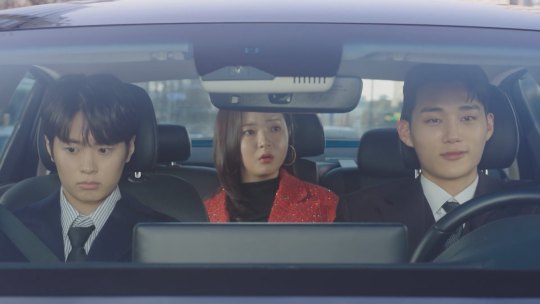
My current bet is just on her being overly familiar with Choi Jun, as we saw from her speech patterns in the car ride with both Juns earlier that morning. When she realizes that she already calls Choi Jun "Jun-i Oppa" (an intimate and affectionate way to refer to an older male/brother, as spoken by a female) and she has to call Lee Jun something different, any normal Korean who wanted to breech that level of familiarity would suggest "Lee Jun Oppa" as a way to differentiate the two. But she's been raised in the US too and leaps into suggesting "Jun-i Eonni" (an intimate and familiar way to refer to an older woman/sister, as spoken by a female). Lee Jun comedically bristles at that, saying he'd rather she kept calling him "Pigeon" instead. But she doesn't care and brushes right past societal norms and even still refers to him as Eonni later in her phone conversation with Choi Jun. Choosing this is intentionally queer-coded language as well (because her Korean is otherwise so good, and she doesn't seem to be joking). It's like calling a gay man "girl," or "sister," or "queen."
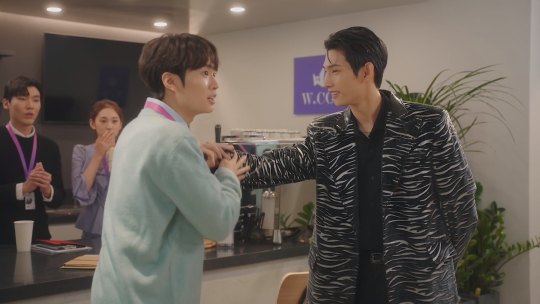
Speaking of the ways others address Lee Jun, it's important to note that in the final scene Simeon repeatedly calls him 우리 이준씨, which basically translates "my Lee Jun." He's not speaking intimately, but he is claiming ownership. This is why we see Hyun Jae's bewildered and sad expression and Choi Jun's stunned and jealous expressions.
Finally, I'll share a tidbit that caused some confusion when @bengiyo watched the episode and take my comment out of the notes on Ben's post and put it here. In his breakroom conversation with Lee Jun, I think it VERY LIKELY Hyun Jae was vaguing about M/M relationships. Because Korean culture is still VERY homophobic, he was trying to feel out how accepting Lee Jun is towards diversity and possibly even invite him into a queer space. He begins by saying, "you know, people have different values depending on the environments they've lived in," and ends with "diversity is valued these days." But instead he "dug his own grave" because Lee Jun's brain immediately went to the morning's events and the confusion he feels from it all (particularly being invited to do a sexual favor for a man who then later received a kiss on the cheek from an overly familiar woman) and he basically said NO, SOME THINGS ARE TOO DIVERSE.
I expect we'll see Lee Jun try to draw more boundaries with Choi Jun, not because he's a man (he flirted back after all) and not because he's his boss (although that may play a role), but mostly because his current impression is that Choi Jun isn't serious. He thinks he flirts like this all the time because he's too American.
@absolutebl I'm tagging you again because you're a linguistic geek too!
#jun & jun the series#jun & jun#jun and jun#asian gay dramas#i love linguistics#watch all my predictions be wrong#i always feel like such a clown
358 notes
·
View notes
Text
🏳️🌈 Linguistic Pride switch-up 🏳️🌈
The Germanic and Romance language families switched words for ‘pride’ with each other!
The Germanic languages borrowed the word pride from Latin prode ‘advantageous, useful’, but the Romance languages borrowed the word for ‘pride’ from Old English orgol, yielding French orgueil, Italian orgoglio, and Spanish orgullo.
337 notes
·
View notes
Text
All right, so we've seen this post by @fuckyeahcoffeeandequality
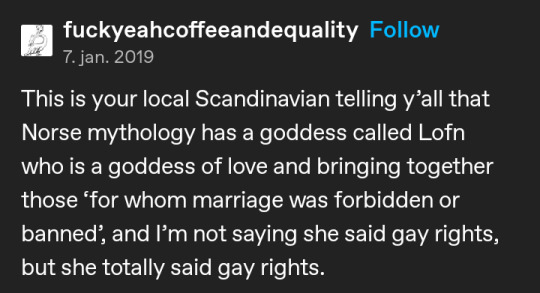
And they're absolutely correct. Some people actually say that Lofn and other goddesses are just different names or aspects of Frigg and/or Freyja, but I am wary of these claims since there are very few sources for norse mythology and there could be many reasons why there is much less written about the goddesses than the gods. But that's just me, and I am by no means an expert in the field. Snorri's Edda does say that Lofn unites those for whom marrige is forbidden, though, and that sounds pretty gay.
A little digression, bear with me I promise I have a point. Lavender has been used as a symbol for homosexuality and queerness for quite some time, and the colour purple even longer. "The Lavender Scare", "Lavender Menace" and "lavender marrige" are all terms and names from queer history, and the colour and the flower came to be empowering for queer people.

WELL
In Icelandic, the name for lavender is 'lofnarblóm', literally translated as 'the flower of Lofn'. The plant is not native to the island and the word seems to be quite recent (the first written example of it I can find is from 1986), in all the other nordic languages they call it some sort of variation of lavendel, except for Faroese, where it appears to be called 'bath plant' (I'm so sorry, I don't speak Faroese). There are a few other words that start with lofnar-, most likely as a reference to the goddess, but most of them seem to be rather old and/or uncommon. I have no idea why 'lofnarblóm' was chosen as a translation for lavender. Knowing icelandic history, the queer connotation was probably not on purpose, but I can't help but get excited about the connection.
TL;DR: Lavender (aka the gay flower) is named after Lofn (aka the gay goddess in norse mythology) in icelandic
#queer history#lavender#linguistics#if anyone has anything to add#please do#night watch posting#it is seven in the am and i am going to bed#queer symbolism#gay#lgbtq#Icelandic#norse mythology#pride
293 notes
·
View notes
Text
Two of the girls in my comedy shounen harem manga have been having homoerotic tension. If it even matters
#and i see people wining ''but X calls her Y-nee it's weeeird'' girl the mc's gay cousin is in love with him are japanese cultural#and linguistic conventions really going to be where you draw the line#mytext#marriagetoxin#animanga
19 notes
·
View notes
Text
It was the old man's last orgy before his annual cure, and he let the whole room know it.
Once again Struck Senseless by another Victorian word that has a sexual meaning now, but didn't back then. There are so many I've come across while reading these victorian books - knocking someone up, using someone roughly, molesting, and, apperently, orgy as well. There have to be words who moved into the other direction! What gems am I missing?? I'd be delighted by any examples! The only one I can think of is wick. Possibly bugger as well - I think most still know its old sexual meaning, but it's only really used as a swear word today
#letters from bunny#raffles#be gay do crimes#crime and cricket#an inaugural banquet#chapter 1#mr. justice raffles#linguistics
20 notes
·
View notes